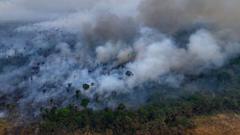Recent satellite data indicates that the planet's tropical forests suffered their highest loss on record last year, with an alarming 67,000 sq km destroyed, primarily due to fires. The Amazon, especially, has been decimated, raising concerns about its potential irreversible decline.
Tropical Forests Face Unprecedented Destruction Amid Climate Crisis

Tropical Forests Face Unprecedented Destruction Amid Climate Crisis
Global satellite analysis reveals that tropical forests have been lost at a record pace last year, prompting serious environmental concerns.
The world's tropical forests, vital for combating climate change, disappeared at an unprecedented rate last year, with new satellite data revealing the alarming loss of approximately 67,000 square kilometers of these essential ecosystems. This figure, which roughly equals the size of the Republic of Ireland, underscored the vital role these forests play in carbon storage, as well as the escalating threats they face from extreme weather conditions and human activities.
Fires emerged as the leading cause of forest loss, surpassing agricultural land clearances for the first time, with the Amazon particularly hard hit by unprecedented drought conditions fueled by climate change and the El Niño phenomenon. Experts caution that the rapid degradation could push these ecosystems, especially in the Amazon, toward a tipping point where they may irreversibly shift from rich forest to savanna.
A recent study echoes this warning, suggesting that continued global warming could lead to significant dieback of the Amazon, threatening its rich biodiversity and dramatically altering global climate patterns. To date, the Amazon has functioned as a carbon sink, absorbing more carbon dioxide than it emits, yet the rampant fires associated with deforestation are now contributing to greenhouse gas emissions—estimated at 3.1 billion tonnes last year, comparable to the annual emissions of the European Union.
In contrast, progress was observed in Southeast Asia, where governmental and community-led efforts led to an 11% reduction in primary forest loss in Indonesia, showcasing a successful model for forest preservation. Experts underscore the importance of sustained political commitment to forest protection, especially in light of Brazil's fluctuating success under changing policies.
As the world approaches the COP30 UN climate summit, set to take place in the Amazon, discussions around innovative solutions for forest conservation are paramount. One potential strategy includes financial incentives for countries that maintain their tropical forests, aiming to create economic benefits for preservation rather than deforestation. With the right policies and sustained efforts, there is hope for a future where these critical habitats can be safeguarded.
Fires emerged as the leading cause of forest loss, surpassing agricultural land clearances for the first time, with the Amazon particularly hard hit by unprecedented drought conditions fueled by climate change and the El Niño phenomenon. Experts caution that the rapid degradation could push these ecosystems, especially in the Amazon, toward a tipping point where they may irreversibly shift from rich forest to savanna.
A recent study echoes this warning, suggesting that continued global warming could lead to significant dieback of the Amazon, threatening its rich biodiversity and dramatically altering global climate patterns. To date, the Amazon has functioned as a carbon sink, absorbing more carbon dioxide than it emits, yet the rampant fires associated with deforestation are now contributing to greenhouse gas emissions—estimated at 3.1 billion tonnes last year, comparable to the annual emissions of the European Union.
In contrast, progress was observed in Southeast Asia, where governmental and community-led efforts led to an 11% reduction in primary forest loss in Indonesia, showcasing a successful model for forest preservation. Experts underscore the importance of sustained political commitment to forest protection, especially in light of Brazil's fluctuating success under changing policies.
As the world approaches the COP30 UN climate summit, set to take place in the Amazon, discussions around innovative solutions for forest conservation are paramount. One potential strategy includes financial incentives for countries that maintain their tropical forests, aiming to create economic benefits for preservation rather than deforestation. With the right policies and sustained efforts, there is hope for a future where these critical habitats can be safeguarded.





















